Guinea pigs could not manufacture vitamin C in their bodies. They need constant sources of it to stay healthy. Most veterinarians recommend wholesome fruits, vegetables, and roughage to help your guinea pig maintain their health.
So, what foods should and should not be fed to guinea pigs? Guinea pigs can eat a variety of vitamin-C rich foods on a daily and weekly basis to keep them happier and healthier. They also require a constant source of hay, in addition to pellets, fruits, and vegetables. Guinea pigs are plant eaters, which means that anything that isn’t plant-based might be harmful to your pig.
While most pellet foods are fortified with the daily vitamin C levels that your guinea pig needs, feeding them fruits and vegetables gives them a more natural source of the vitamins that they need. Eventually, as you continue reading the article, you will discover that feeding them can be a bonding experience with your pet. Let’s start!
Table of Content
Water, Hay, and Pellets | Guinea Pigs Essentials
Water
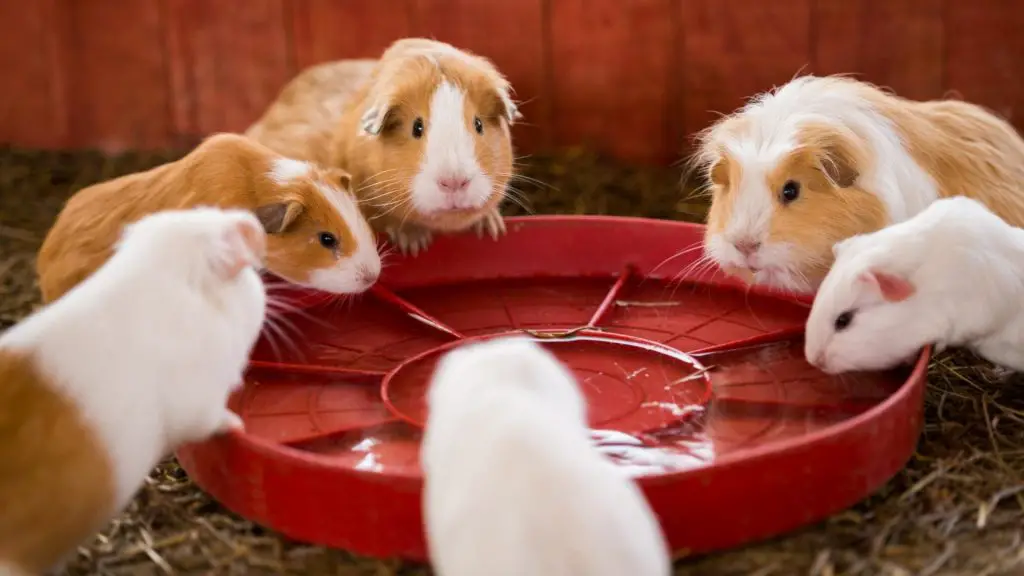
Like with any other pet, your guinea pig should have an unlimited supply of clean water in their cage. Keeping their water bottle clean and their water supply fresh is one of the biggest responsibilities of owning a guinea pig.
Their small bodies can become dehydrated very quickly, so they consistently drink water throughout the day. You should clean their water bottle with animal-friendly soap and replace their water with filtered water daily.
Hay
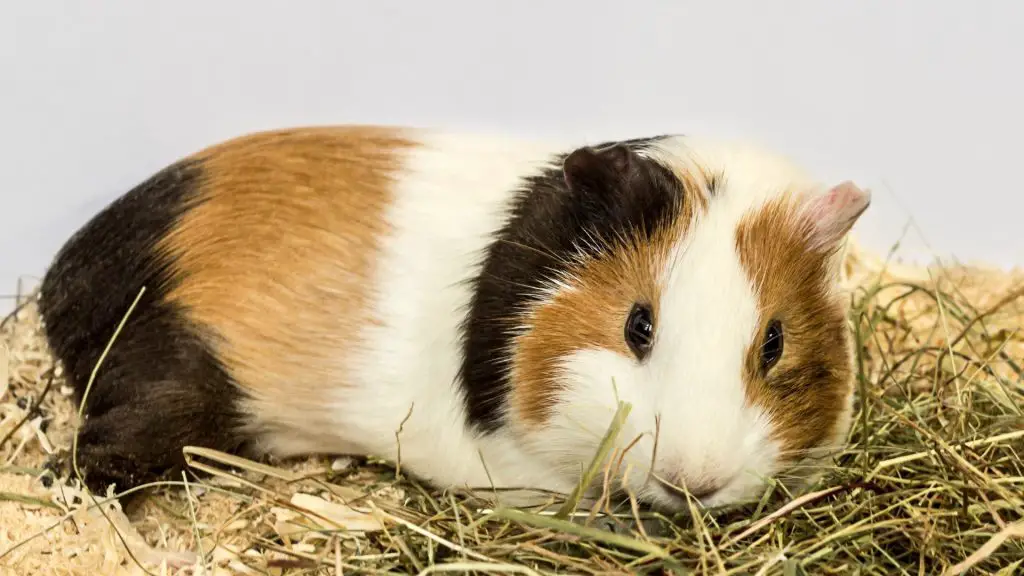
Hay is the most important part of your guinea pig’s diet. You will notice that they eat more hay than anything else. The reason your cavy constantly munches on hay is that it helps with their dental and digestive health. As your pet chews on hay, it grinds the tops of its teeth down, keeping them from growing too long.
If your guinea pig has overgrown teeth, this will prevent them from eating at all, which can have significant health repercussions. The vitamins and minerals in hay also help regulate your guinea pig’s digestive system so that they can process and extract nutrition from other foods.
There are two major forms of hay on the market: alfalfa hay and timothy hay. When your pet is a baby, alfalfa hay is best for them because of the higher vitamin C content. As they grow, you can change over to timothy hay, which has more fiber in it. The higher fiber content is crucial to guinea pig health as they reach adulthood.
Pellets
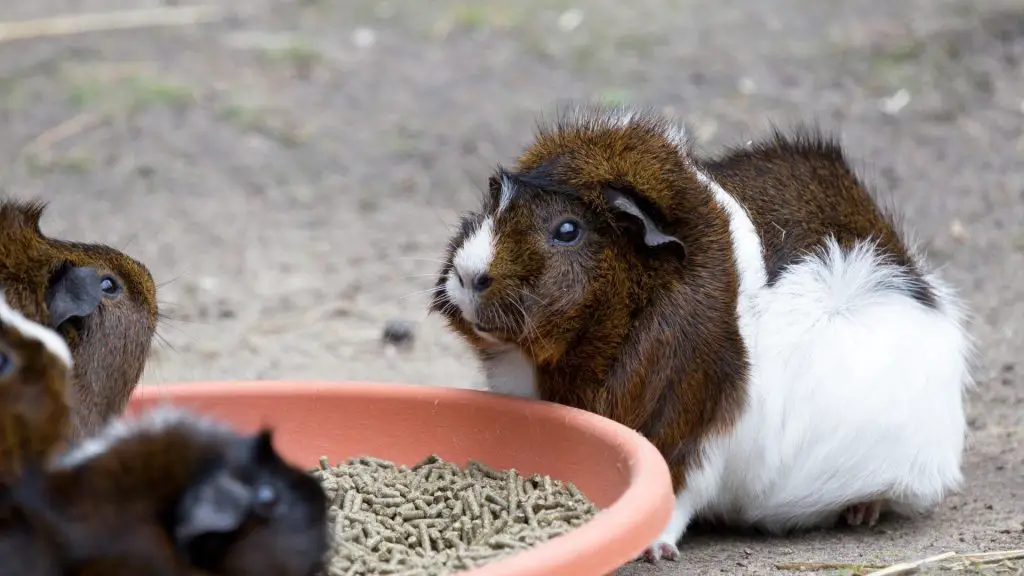
Another necessity in your guinea pig’s cage should be pelleted food. This contains fiber and vitamin C, so it meets most of their nutritional needs. There are many brands on the market, each with a different taste. Experiment with different kinds until your guinea pig expresses that he or she likes the food.
It’s always best to select a pelleted food with a high concentration of vitamin C, which will add to their intake of the vitamin on a daily basis. This food supply, just like their water, should be refreshed every day. At the end of every night, empty their food bowl and clean it before you add fresh food to it.
Fruits and Vegetables | Your Guinea Pigs’ Favorite Foods
Fruits
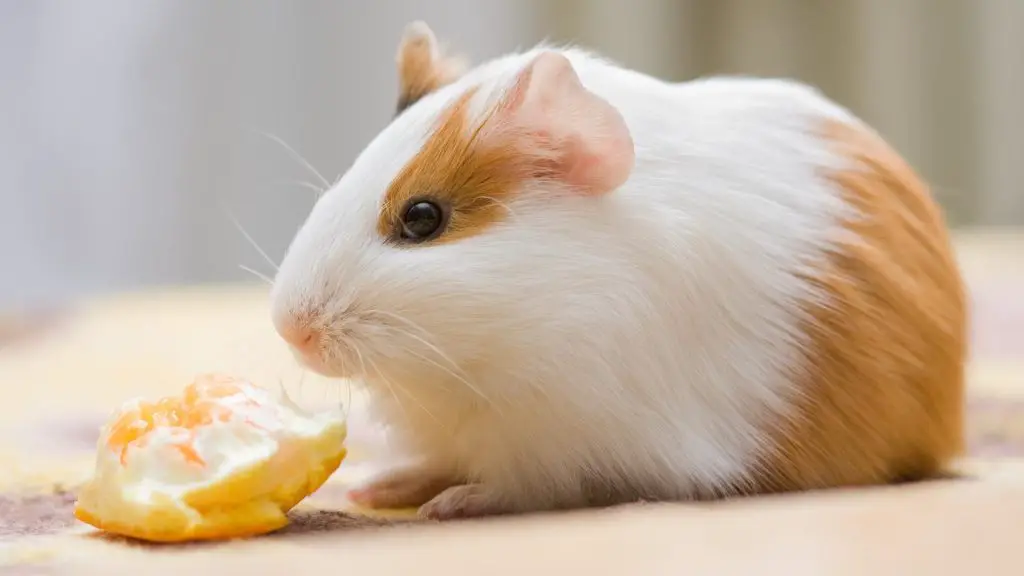
Guinea pigs love to snack on fruits daily, but most of them have high sugar content. These fruits should be fed to your guinea pig sparingly, or in small quantities, but most of them are healthy and safe for your pet to eat every day.
Several fruits have high vitamin C content, which makes them the perfect treat. For an extra special treat, you can feed your pet jackfruit about once a month. It is extremely high in sugar, so it should be given sparingly.
Vegetables
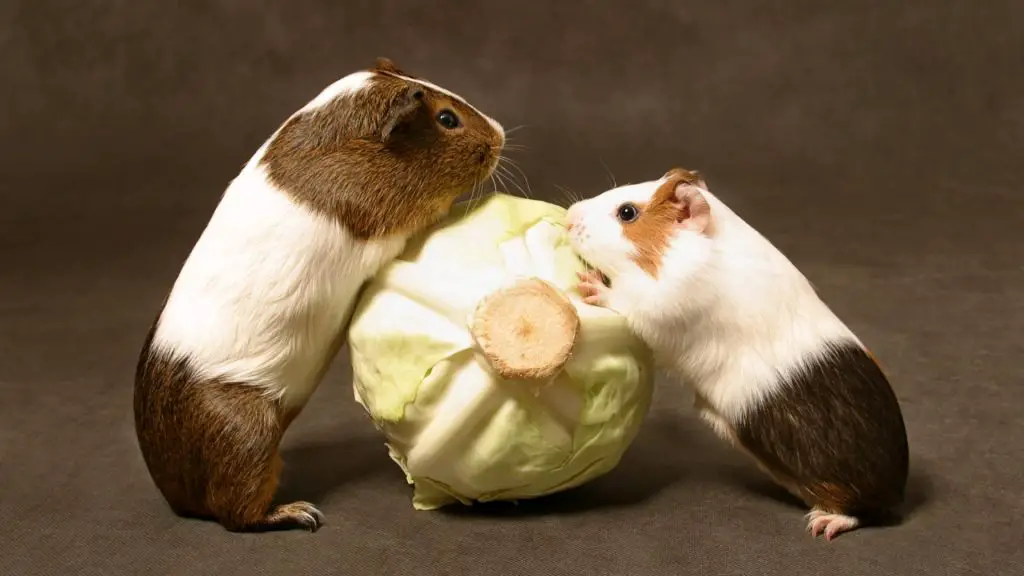
Your new pet will also love to chew on vegetables, which is where they will get the most vitamins and minerals that they need for their diet. Before they were domesticated, guinea pigs were herbivores who ate grasses and plants, so it is in their nature to eat green vegetables.
While leafy greens are an essential part of any guinea pig diet, steer clear of iceberg lettuce. It has almost no nutritional value for your pet, and the high-water content can make your guinea pigs bloated.
Other green vegetables, such as cabbage, broccoli, and cauliflower can also upset your pet’s stomach, so these should be treats instead of a regular part of their diet. Also, use moderation with Swiss chard, for it can give your guinea pig diarrhea.
The List: Foods That Guinea Pigs Should Eat
Daily
These foods are great when given no more than once a day. These are an excellent snack time treat for your furry friends:
- Banana leaves
- Bermuda Grass
- Bibb lettuce
- Boston lettuce
- Butterhead lettuce
- Carabao Grass
- Carrot
- Cherry Tomatoes
- Chinese Parsley
- Cilantro
- Clover
- Coriander
- Corn Husk
- Corn Silk
- Green Leaf Lettuce
- Green/Bell pepper
- Meadow Hay
- Napier Grass
- Oat Grass/Hay
- Radicchio
- Raspberry leaves
- Red Leaf Lettuce
- Rockmelon
- Romaine Lettuce
- Swiss chard
- Wheatgrass
- Yellow Bell Pepper
- Zucchini
2-4 Times a Week
The following items on the list are a pleasant surprise treat for your guinea pig. When given often, these items can throw off your guinea pigs’ nutrient balance causing stomach upset and gas.
- Arugula lettuce
- Broccoli leaves
- Brussel sprouts
- Capsicum
- Cauliflower Leaves
- Celery
- Chinese Celery
- Cucumber
- Flat-leaf Parsley
- Grapes
- Green beans
- Italian Parsley
- Jicama
- Kiwi
- Lemongrass
- Mint
- Napa Cabbage
- Orange peel
- Parsley
- Rambutan
- Red Bell Pepper
- Red tomatoes
- Rosehips
- Red Cabbage
- Snow Peas
- Squash
- Strawberry
- Watercress
- Young Mango Leaves
Once or Twice a Week
These foods are great when given every few days to provide certain vitamins and nutrients. However, when given too frequently can cause stomach upset, and no one likes a sore tummy.
- Apple
- Asparagus
- Baby Spinach
- Banana
- Basil
- Bean Sprouts
- Blackberry
- Blueberry
- Bok Choy
- Broccoli
- Cantaloupe
- Carrots
- Cauliflower
- Chayote
- Chico fruit
- Corn
- Eggplant
- Grapefruit
- Green Cabbage
- Guava
- Kamote tops
- Longan
- Mango
- Moringa
- Mustard Greens
- Orange
- Papaya
- Papaya leaves
- Pear
- Peas
- Pineapple
- Radishes or radish leaves
- Spinach
- Sweet potato
- Starfruit
- Thyme
- Water Spinach
- Watermelon
The List: Foods That Guinea Pigs Should Not Eat
Knowing what not to feed your guinea pig is just as important as what they should eat regularly. Feeding your guinea pig the wrong thing can make them seriously ill or even kill them. Guinea pigs are plant eaters, meaning that anything not plant-based can severely harm your piggy.
- Anything with glue, varnishes, paints or dyes
- Avocado
- Beans
- Cabbage
- Cauliflower
- Chives
- Chocolate or candy
- Dairy (e.g., yogurt, cheese, kefir, sour cream, cream cheese, and cottage cheese)
- Garlic
- Iceberg lettuce and lighter lettuces can cause severe diarrhea.
- Leeks
- Nuts
- Onions
- Plastic toys
- Rhubarb or any plants high in oxalic acids
- Seeds
- Shallots
- The meat of any kind (e.g., dog food, cat food or ferret food)
- Tomato leaves or stalks are toxic (tomatoes themselves are fine)
Related: What Can’t Guinea Pigs Eat? | Guinea Pig Foods to Avoid
What If My Guinea Pig Doesn’t Get Enough Vitamin C?
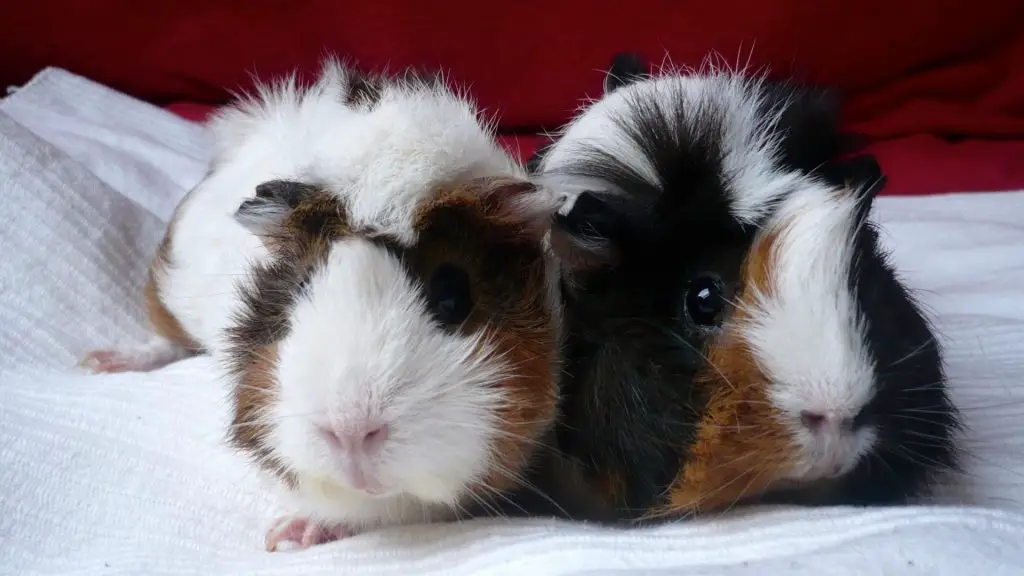
Feeding your guinea pig foods from this list on a daily to monthly basis is the cornerstone of good health. They may not like many of these foods, so experiment with them to see what they like.
All of the foods on this list contain vitamin C, but the levels vary. Depending on the age and the health of your piggy, they may need more or less of the nutrient for their specific needs.
How Do I Know That My Guinea Pigs Have a Vitamin Deficiency?
Vitamin C deficiency in guinea pigs can be hazardous to their health. If you notice these symptoms, bring your pet to your veterinarian to have them tested for vitamin C deficiency:
- Lethargy
- Diarrhea
- Changes in movement, such as pain from swollen joints
- Bleeding under the skin
- Wounds that won’t heal
- Rough fur (with coarse-hair guinea pigs, the fur will feel rougher than usual)
- Change in appetite
- Weight loss
This is a serious condition that can be fatal to guinea pigs if it is left untreated. Feeding your pets any of the foods on this list can prevent this condition, giving your beloved family member a long and healthy life.
Leave a Food Guide for Anyone Caring for Your Guinea Pig
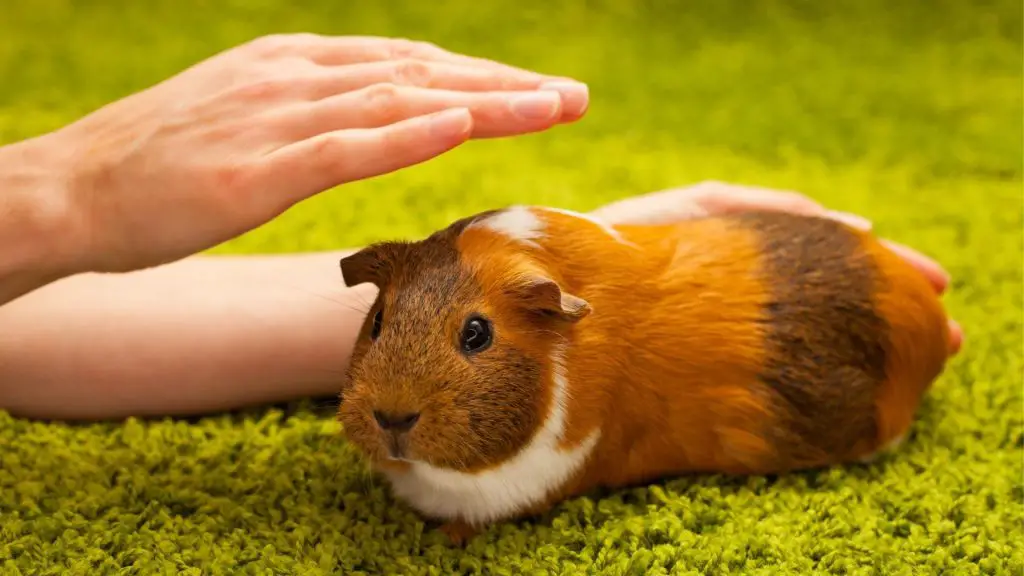
Going out of town can be stressful enough without having to worry about your pets while you’re gone. Create and leave a food list for anyone who will be caring for your guinea pig while you are out of town.
Be sure that they understand the list when it comes to feeding your guinea pig. Ensure that the person providing care for your furry babies understands the importance of sticking to the diet you have assigned.
Summary
We also made a full guinea pig food list (150+ Types of Foods) if you are interested. You can find almost anything on this detailed list with an answer to whether they can eat it or not. For every food, we have a separate article where we explain health benefits, risks of guinea pigs eating that food, nutritional facts, serving sizes, and some fun facts about that food.
List of Sources
How to Care for Your Guinea Pig
